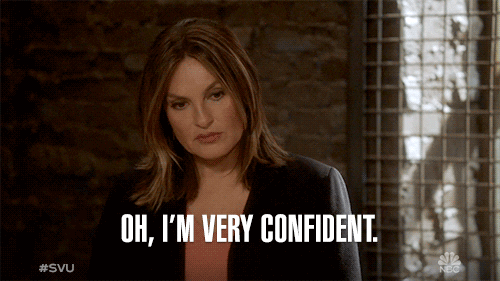This goes out to all the people that don't feel as confident as they want to be when they're in social settings. I'm the type of person that can assert themselves, but I plan on going into the legal field, and as a woman and as a person of color, I will constantly be swimming upstream. I've been trying to be more intentional with my language and I want to stop using "soft" phrases, where I put disclaimers at the beginning of my sentences, or add filler words. I'm done. For far too long, women are told to be "nice" and that we'll "catch more flies with honey than vinegar." I can be completely professional, respectful, and a nice person to work with, without putting myself or my ideas down. So, here are some things I'm trying not to say in school and in real life.
"I Don't Think This Is Right, But..." or "This Is Just My Opinion, But..."
I'm totally guilty of this. I put a disclaimer at the beginning of a sentence because I don't want to offend someone or say the wrong thing. But, if I know what I'm talking about, I shouldn't have to put a disclaimer. If I'm wrong, I'm wrong and I'll learn from it.
"Like", "So", or "Umm".
These are filler words and I use them when I can't think of what to say next, or when I've lost my train of thought. I think they're unavoidable at times, but being cognizant of when I use them, can help me use them a little bit less.
"You Get It Right?" or "Does That Make Sense?"
This implies that you need external validation or that you need people to agree with you. When I'm speaking to a person that presumably knows more than me, like a professor, or a TA, I use these phrases because I'm uncomfortable and I want the validation, and I think that's fine. When I'm among my classmates, I'm trying not to use the phrases because we all presumably know the same amount of material; we're equals.
Trailing Off...
This happens to me when I've made a good point, but I don't think I've spoken enough or given ample details, so I try to add on, but I've made my point and I don't need to keep talking. So, I'm trying to end on a high note or a question to bounce back to a professor or a classmate to keep the discussion going, so no one has to awkwardly pick the conversation back up.
"Sorry."
This is the number one thing I'm trying not to say, when I don't mean it. I want people to know that I value and respect their time and input; but I often forget that they should also do the same for me. I say sorry whenever I think I've wronged someone, even slightly, like making them wait for 5 minutes. I'm trying to thank people for their time instead.
- 50 Things You Should Stop Apologizing For ›
- Just, Like, Stop, You Know, Using Filler Words ›
- Confidence Is Key ›
- Sorry Not Sorry: Why Women Need To Stop Apologizing ›
- Stop Using These Words And Sound More Confident At Work ... ›
- Four phrases that make you sound less confident ›
- Want to Improve Your Communication Skills? Stop Saying These 25 ... ›
- Stop apologizing and say these things instead ›
- 7 Phrases to Stop Saying at Work - The Everygirl ›
- How to Stop Saying “Um,” “Ah,” and “You Know” ›
- Want to Be More Confident? Stop Saying These 7 Words | Inc.com ›
















